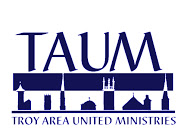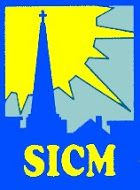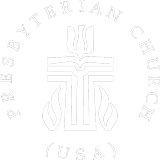
Troy Area United Ministries (TAUM) is a 501(c)3 nonprofit organization of congregations, joined with people of all faiths and backgrounds to serve those in need, to work for social justice and to build stronger communities. About 40 congregations participate.
TAUM serves all of Rensselaer County, and beyond. Anyone who walks in the door can receive hot, nutritious meals 4 times a week. TAUM mobilizes congregations to do the work of ministry. For example, congregations prepare food and eat with guests of the center. TAUM’s Furniture Program gives good, used essential furniture free of charge (about $250,000’s worth each year) to recently homeless families, women and dependent children fleeing domestic violence, those suffering catastrophic event like fire or flood and to low-income families. TAUM’s Troy Damien provides holistic supportive and prevention services to persons living with HIV. Our Computers for Kids Program serves as a meaningful summer youth employment program through which low income students throughout Rensselaer County learn to integrate computer technology skills with problem solving and career development. Campus Ministry at Sage and RPI is also a TAUM Program.
TAUM is also a South Troy community center, gathering neighbors to work on issues of health, safety, and poverty. TAUM equips congregations to reach around the world by organizing the CROP Hunger Walk and to work on inclusion of people of all races, faiths and backgrounds through our Rev. Dr. Martin Luther King, Jr. Events and Scholarships Program. Over 2,000 people are served through TAUM annually. Rev. Donna Elia is Executive Director.

The Schenectady Inner City Ministry is an ecumenical partnership, founded in 1967, of 54 congregations (15 denominations) for ministries of social service and social justice.
SICM, with and for the churches, addresses current issues such as food insecurity, affordable housing initiatives, health and fitness, various economic development initiatives, and collaborations such as the Committee for Social Justice, Community Crisis Network, and Schenectady County Embraces Diversity.
We operate…
- the largest emergency food organization in Schenectady County
- the Schenectady Damien Center, a drop-in hospitality and resource center for people infected with or affected by HIV/AIDS
- a Summer Lunch program, providing free and nutritious lunches for Schenectady youth
- wellness initiatives including Safe Parks and Edible Playgrounds and Spiritually Sound/Physically Fit
Our mission is…
- to minister to the urban community and its individuals
- to challenge religious organizations, both member and non-member, and other individual members, and the general community, to provide greater involvement and service in the urban community
- to develop understanding, trust, and cooperation among religious organizations and encourage their membership in the organization

Mission Statement:
Rural & Migrant Ministry works for the creation of a just rural New York State through:
- Nurturing leadership
- Standing with the disenfranchised, especially farm workers and rural workers
- Menu of Hope: A resource guide for individuals, congregations, and other institutions that are looking for ways to stand with our immigrant brothers and sisters. The Menu is now available to download online or for print orders.
- Changing unjust systems and structures
Vision Statement:
Rural and Migrant Ministry Inc. acts to overcome the prejudices and poverty that degrade and debilitate all members of our society by building communities that celebrate diversity, achieve true mutuality and offer dignity and opportunity to all. Rural and Migrant Ministry is an interfaith organization whose members believe that inspiration comes from participation in the creation of a just world.
To this end Rural and Migrant Ministry is committed to:
- Honor and support efforts of those who are disenfranchised, especially migrant farm workers and the rural poor, as they seek greater self-determination;
- Transform ourselves to use our privileges and actions, not as pillars of oppression, but as forces for justice;
- Nurture the development of leaders from various communities;
- Build a ministry that brings people of diverse socio- economic, religious, cultural and racial backgrounds together and promotes the exchange of resources, ideas and hopes;
- Address the root causes of poverty and prejudice that are maintained in public and private policies through advocacy and the development of alternative policies and structures;
- Be equitable, just and honor diversity within the structures, policies, programs, activities and mores of the organization.

